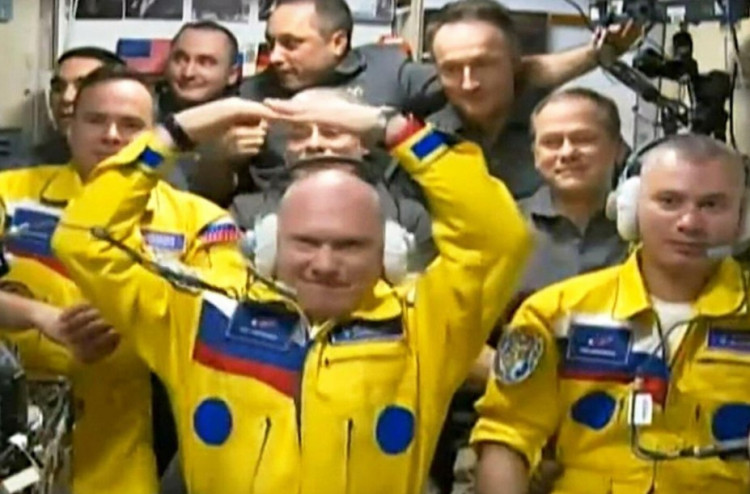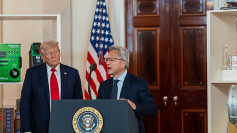The cosmonauts wearing yellow and blue flight suits on the International Space Station weren't showing support for Ukraine, Russia's space agency Roscosmos said.
In a Telegram post translated by Google, Roscosmos officials denied any connection between Ukraine and the flight suits, calling the media reports "a funny invention of foreign bloggers and media."
The cosmonauts - Oleg Artemyev, Denis Matveev, and Sergey Korsakov - boarded the space station on Mar. 18 wearing brightly colored flight suits that were yellow with blue patches, similar to the colors of the Ukrainian flag. With Russia currently engaged in a brutal war against Ukraine, the cosmonauts' choice of clothing sparked speculation in the media about whether they were expressing support for the Ukrainian people.
"The design of the uniform was agreed upon long before current events," Roscosmos said. "Sometimes yellow is just yellow."
Roscosmos said the flight suits are designed with the colors of Bauman Moscow State Technical University, where all three cosmonauts studied.
According to a UPI news report, the Russian Academy of Sciences sews together the flight suits of the cosmonauts about six months before launch. Artemyev previously wore a yellow and blue flight suit during a 2014 mission to the International Space Station, according to a second Telegram post from Roscosmos.
The head of Roscosmos, Dmitry Rogozin, also mocked the media's connection to Ukraine, writing on Twitter that "under no circumstances will we force cosmonaut graduates of Bauman University not to wear the colors of their alma mater's coat of arms."
Artemyev, Matveev, and Korsakov launched to the space station on Friday aboard a Russian Soyuz MS-21 spacecraft that took off from Kazakhstan's Baikonur Cosmodrome. A few hours later, the trio docked at the space station to begin a six-month mission aboard the orbiting laboratory.
The Soyuz cosmonauts joined the station's seven other crewmembers, who included four American astronauts, two other Russian cosmonauts, and one European astronaut representing Germany.
NASA and Roscosmos are two of five agencies involved (the others are the Japanese space agency JAXA, the Canadian Space Agency, and the European Space Agency, which does not include Ukraine). The station is scheduled to retire as early as 2025, but the Biden-Harris administration pledged in December to extend the program until 2030.
Russia has also threatened to exit the ISS program in response to U.S. sanctions. The U.S. has imposed more sanctions in reaction to Russia's incursion into Ukraine, reigniting speculation about whether Russia may abandon the space station initiative entirely. However, NASA has stated that the ISS partners are still working together and cooperating at this time.





